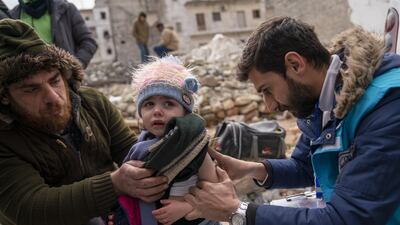More than six million children in Syria and Turkey are in dire need of aid 100 days after a powerful earthquake and multiple aftershocks shook the region, the UN children's agency Unicef said on Wednesday.
A 7.8-magnitude earthquake struck south-eastern Turkey and Syria on February 6, followed by thousands of aftershocks, killing more than 50,000 people and displacing more than 5.9 million. Surviving families and children were left homeless and desperate, without access to essential services and water.
The agency said that millions of children and families are struggling to rebuild their lives, with 2.5 million children in Turkey and 3.7 million in Syria in need of continued humanitarian assistance.
“In the aftermath of the earthquakes, children in both countries have experienced unimaginable loss and grief,” said Unicef's Executive Director Catherine Russell, who visited both countries weeks after the initial quakes.
“The earthquakes struck areas where many families were already incredibly vulnerable. Children have lost family and loved ones, and seen their homes, schools and communities devastated and their entire lives turned upside down.”
Unicef is appealing for $172.7 million to implement its Immediate Response Plan for the earthquake in Syria.
So far, $78.1 million has been received, with nutrition, health and education remaining significantly underfunded.
In Turkey, the UN agency is calling for more than $85 million of a $196 million appeal to provide required services to children in need.
Unicef says that funds are needed to provide nutrition, water, sanitation and hygiene programmes that are critical to ensure children’s health and well-being, and to reduce the risk of disease outbreaks.
In some parts of Turkey, poverty rates among children were already high before the earthquake, with approximately 40 per cent of households living below the poverty line, compared to about 32 per cent nationwide.
“Estimates show that without sustained local and international support, including cash transfers and ensuring access to education, this figure could rise to more than 50 per cent,” the statement said.
In Syria, children were already struggling after 12 years of sustained conflict, which has had an impact on all infrastructure and public services.
“The massive tremors in February exacerbated this, causing further damage to schools, health care, and other essential infrastructure,” said the statement.
Severe damage to water and sewage infrastructure has put 6.5 million people at an elevated risk of waterborne diseases, including cholera.





























































